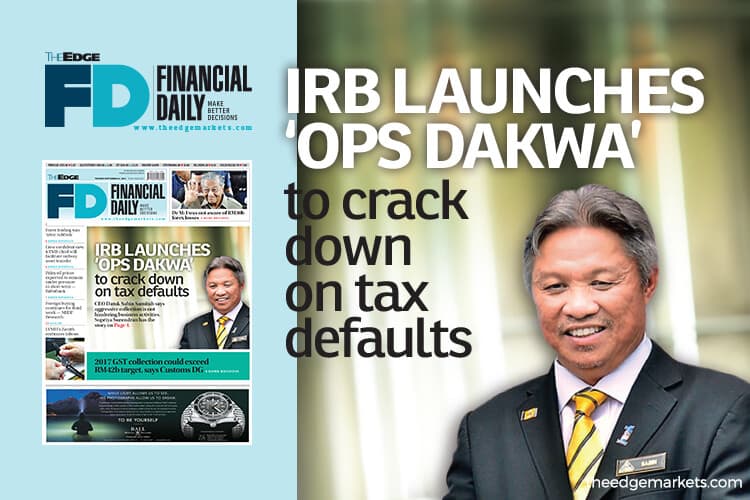
This article first appeared in The Edge Financial Daily on September 19, 2017
KUALA LUMPUR: The Inland Revenue Board of Malaysia (IRB) kicked off another operation called “Ops Dakwa” yesterday to improve its tax collection.
The latest operation aims to crack down on large companies that have defaulted on tax payments.
IRB chief executive officer (CEO) Datuk Sabin Samitah revealed that the operation will involve 1,601 civil cases involving large companies, of which some are public listed entities.
“Most of these big companies have not paid their taxes; we are going to serve them notices by hand and if they do not want to discuss with us on how they are going to [settle their tax liabilities], we are going to wind up these companies,” he told the media on the sidelines of the Goods and Services Tax Conference 2017 yesterday.
The 1,601 cases involve total unpaid taxes of RM728 million, according to Sabin.
“For most of these cases, the IRB has granted them a [stipulated] time frame for tax payment and even an instalment scheme was worked out, but a few of these companies have not paid according to the instalment scheme given,” he said.
Last month, the IRB signed a joint audit programme standard operating procedure with the Royal Malaysian Customs Department to tackle tax compliance more effectively.
Prior to that, IRB has had a nationwide “Ops Saji”, an audit review which targeted food-related businesses that ended on Aug 25. Subsequently, the IRB announced that the next target group for its tax audit operation would be professionals such as lawyers, engineers and doctors.
Sabin dismissed the notion that over aggressive tax collection activities could dampen business confidence.
“It is not hampering investments, because if you compare to [the tax regime] in other developed countries, their enforcement is much stronger than ours,” he said.
Sabin said that the actions by the IRB may be portrayed as aggressive currently partly because the tax authority has started to reveal more on its operations than before.
“What you are seeing now is because we (the IRB) have engaged the media more on our operations compared with the past.
“Now, even for a simple operation that we conduct, we will disseminate the information to the media,” he said.
At the panel session at the conference, Sabin said legal action will also be taken against companies which have been audited and investigated by the IRB, but do not have their supporting documents in order.
“We are going to take legal action against those who have been audited and investigated before, and which we have advised to keep proper documentation but they have not done so.
“It is very clear and simple; for those who comply with the IRB [requirements, we] will make it very easy for them, and for those who don’t, we will make it very difficult for them,” he said.
The IRB has a tax collection target of RM127 billion this year. Sabin did not reveal the collected amount thus far, but shared that year to date, the sum has increased by more than 2% year-on-year.
“The collection to date is [more than] 2%, compared with the collection in the same period last year; we are trying our best to reach the target set,” said Sabin.
On whether entities operating in the digital economy sphere, such as Uber, Google and Grab, would be subject to Malaysian taxation, Sabin said that this is in the pipeline.
“For [entities operating in] the digital economy like Uber, Google and Grab, [they are subject to] international law, therefore we are still waiting as the time frame for the Organisation for Economic Co-operation and Development (OECD) to come up with the law for this will be in 2020.
“Most of the developing countries have requested the OECD to come up with the law next year because we are losing revenue from the way that they conduct their business, taking Google as an example, about 80% of their revenue is transpired to lower tax jurisdictions and only 20% [flows] to countries [with higher tax jurisdictions] like Malaysia,” he said.